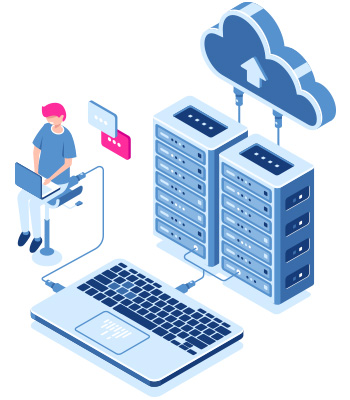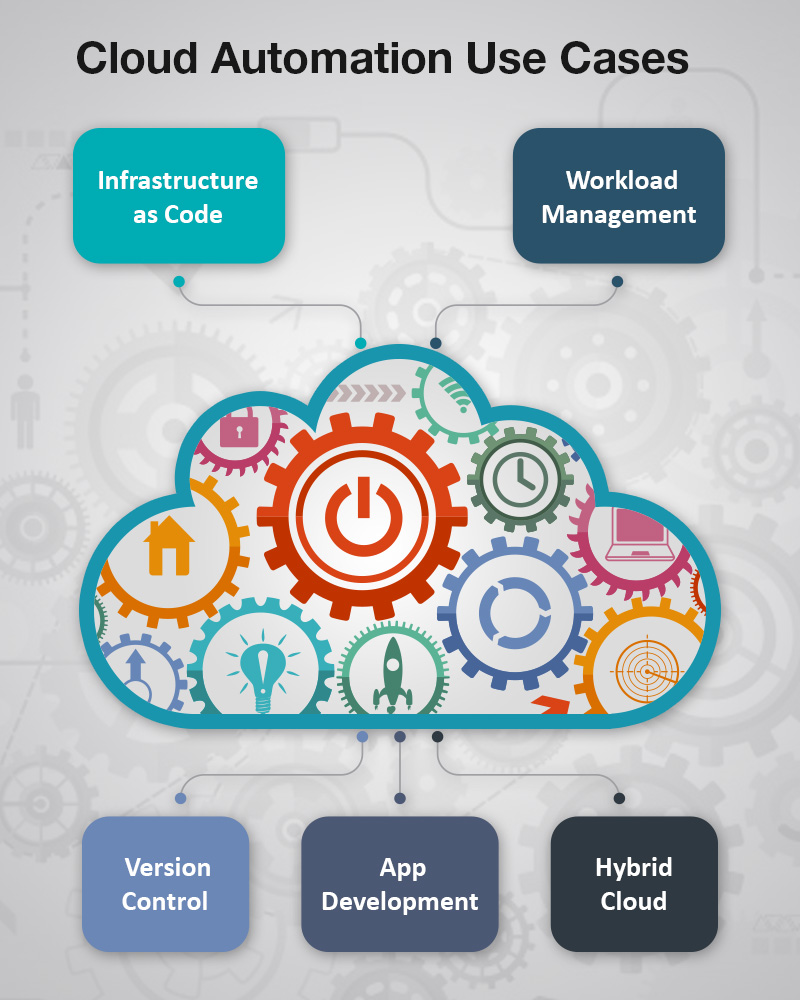Cloud Automation Services
Leverage Tools and Resources to Automate Cloud Management
Ever-growing consumer demands and changing IT scenarios are making ‘automation’ imperative across many organizations of all sizes. Automation plays a key role by automating many manual tasks, easing operational and maintenance burdens. Because of this reason, automation is enjoying a more expansive presence and relevance on almost all technology platforms. And the cloud needs no exception!
Though cloud computing services have done their best to ease organizational burden, automation became the need of the hour for many critical cloud operations as enterprises started taking a different approach to cloud computing. Automation in the cloud environment has come a long way from just being a trend to becoming key in the successful cloud journey for migration and continuous optimization.
Moreover, to meet the changing IT infrastructure landscape, emerging new services, and scaling cloud operations, the automated management of cloud resources holds high significance among IT teams.
Defining Cloud Automation
From a broader perspective, Cloud Automation refers to leveraging technology tools and resources to reduce the manual burden of provisioning and managing cloud computing workloads. Cloud Automation is a software-based solution that automates installation, configuration, management, and other cloud-related tasks and operations.
These can be repetitive tasks such as provisioning and configuring resources like virtual machines, establishing clusters and load balancing, instigating virtual networks, making deployments, and cloud monitoring and managing performance.


Cloud Automation Use Cases
In general, cloud automation use cases refer to using the dynamic abilities of cloud management tools or a cloud solution to perform functions with less manual intervention.
For instance,
- Adding new instances part of an auto-scaling scenario with auto-scaling groups
- Auto-provisioning servers to meet scaling requirements
- Identifying and stopping unused instances
- Taking data backups on pre-set intervals
There are also other specific use cases for cloud automation, which include:
Infrastructure as Code
This is the most common use case for cloud automation. Cloud automation tools and processes use resource pools to define configuration items such as VMs, containers, and virtual networks. These configuration items add required application components and services, assembling them to form a complete operational environment for deploying workloads.
Workload Management
It is a crucial part of workload lifecycle management; cloud automation helps admins remove unused and unwanted long-term entities and their configuration items. It helps a lot in workload management by facilitating automatic scaling tasks such as adding more resources or removing excess or unwanted instances.
App Development
Continuous delivery and continuous integration are critical to the success of agile development driven by DevOps culture. The success here relies on the speed of resource deployment and scalability in testing software releases. While public clouds can already do so, private clouds are not that successful. Cloud automation tools can be the savior in adding such capabilities to any cloud variant.
Version Control
Cloud automation services offer version control through consistent setups that align with organizational regulations and policies. These setups help businesses track the resource usage users, predict resource usage, and achieve improved service quality.
Hybrid Cloud
In a hybrid cloud environment, cloud automation automates tasks related to a private cloud environment and enables integration with public cloud platforms such as Azure, GCP, and AWS.
Cloud Automation Tools

AWS CloudFormation
Suitable for the AWS cloud platform, this tool helps automate and deploy resources into your AWS cloud infrastructure. Handles automated management of accounts, supporting business scaling.

Puppet
It is a leader in the configuration automation market. Helps model, configure, and enforce required infrastructure configurations. Works for all cloud variants, from computing to storage and further to networking resources at a large scale.

Ansible
It is an easy-to-use and task-based cloud infrastructure automation tool known for its ease in automating configurations. It uses a simple’ playbook’ language to compose automation, configuration, and orchestration tasks.
Chef
Another popular infrastructure configuration tool that helps in effective compliance management, from enforcing configuration policies to continuous delivery of production code. Besides compliance, it also ensures high availability and GUI-based workflow pipeline creation.

Kubernetes
A container orchestration tool known for automating deployment, scaling, and management of container apps. Cloud Native Foundation’s flagship project is supported by leading tech giants such as Google, AWS, IBM, Microsoft, etc. Allows to deploy and run apps on microservice architecture for all cloud variants.

Terraform
An open-source tool that helps you automatically configure high-level resources through extensive graphing. Requires a configuration management tool like Puppet or Chef to automate software on those resources.

Google Cloud Deployment Manager
Suitable to build cloud infrastructure through Google Cloud Computing. Automate configuration and deployment of Google Cloud with repeatable deployments and template-driven configurations.

Microsoft Azure Automation
The automation and configuration service for consistent management across Azure and non-Azure environments. It also provides automated control over maintenance and compliance tasks.

Cisco Intelligent Automation
Supports Cisco and other cloud environments, from cloud infrastructure automation to hands-on management and provisioning of instances. Some salient features are self-serving portals for users, multi-tenancy, and network service automation.

SaltStack
Focused on automating security compliance, this tool helps configure and manage all aspects of cloud-based infrastructure. Agentless node management and exceptional security tooling are the salient features of this tool.

VMware vCenter Configuration Manager (VCM)
Configure and maintain VM cloud environments in line with security and compliance requirements—control configuration of your VMware-based infrastructure from a centralized location.

CFEngine
Configuration management tool used to automate IT infrastructure for enterprises of all sizes. With requiring central management, CFEngine runs on autonomous agents that run at regular intervals to enforce configurations.

Foreman
Best for teams building an open-source lightweight tool that manages the complete server lifecycle. Supports provisioning of cloud instances on all major cloud solution providers.
Benefits of Cloud Automation
Cost Savings
Automating tasks that demand manual intervention naturally eases operational costs and maintenance burden and allows teams to focus on planning further strategies. This could be one of the essential ways to achieve cloud cost management and optimization.
Faster Innovation
As the responsibility of data center and resource management lies with cloud service providers, implementing automation makes it easier for organizations to innovate faster and speed up the developmental process.
Increased Control
Automation within an organization is built on internal processes and policies in the cloud environment. This naturally gives the organization better control to make any changes whenever required.
Successful DevOps Implementation
A stable IT environment, backed by uninterrupted infrastructure, naturally executes tasks hassle-free. Conversely, automation support builds team collaboration, contributing to the successful implementation of DevOps practices. Successful implementation of DevOps practices backed by efficient automation strengthens your cloud environment with effective resource utilization.
Why Choose Us?
As a US-based Cloud Services Provider, Veritis assists you at every step of your cloud automation journey, regardless of your current maturity level with automation and autonomics.
We automate your entire cloud infrastructure through our end-to-end cloud automation capabilities, leading you to harness the total business value of automation.
The Veritis Advantage:
- 360° turnkey cloud solutions
- Vendor-agnostic, best-of-breed approach
- World-class expertise
- Optimal customer satisfaction
It’s time to identify, allowlist, and automate critical tasks to ease infrastructure burden and enhance cloud capabilities!